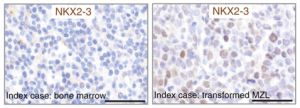A joint study conducted by several scientists around the world has identified a protein involved in marginal zone lymphomas. NKX2-3 is a transcription factor involved in various processes essential to the cell. Until now, it had not been linked to cancer.
The study, published this week in the journal Nature Communications, was led by the group of Dr José A. Martínez Climent, Centre for Applied Medical Research (CIMA) at the University of Navarra, in collaboration with several European and US groups, including that of Dr Yolanda R. Carrasco the Centro Nacional de Biotecnología of the CSIC (CNB-CSIC).
Marginal zone lymphomas make up between 5 and 10% of all lymphomas and three main types can be distinguished. The study indicates that an excess of the protein NKX2-3 can induce abnormal B lymphocyte activity, resulting in extranodal type (MALT) and splenic marginal zone lymphomas (SMZL).
"It is important to study these diseases, to better understand them and find more effective, personalized treatments," Carrasco says. There are currently very few diagnostic and prognostic approaches for these patients. "Moreover,” the scientist adds, “there are no specific therapies."
The authors detected an excess of NKX2-3 in SMZL and MALT lymphoma patients. They also observed that inducing high levels of the protein in mouse B cells led to the appearance of tumours similar to those of the patients.
"On the one hand, our study suggests novel targets for drug development. But also it provides a new tool for the study of disease, as we found that mice that overexpress the NKX2-3 protein could be good models of the human disease."
- Robles EF, Mena-Varas M, Barrio L, Merino-Cortes SV, Balogh P, Du MQ, Akasaka T, Parker A, Roa S, Panizo C, Martin-Guerrero I, Siebert R, Segura V, Agirre X, Macri-Pellizeri L, Aldaz B, Vilas-Zornoza A, Zhang S, Moody S, Calasanz MJ, Tousseyn T, Broccardo C, Brousset P, Campos-Sanchez E, Cobaleda C, Sanchez-Garcia I, Fernandez-Luna JL, Garcia-Muñoz R, Pena E, Bellosillo B, Salar A, Baptista MJ, Hernandez-Rivas JM, Gonzalez M, Terol MJ, Climent J, Ferrandez A, Sagaert X, Melnick AM, Prosper F, Oscier DG, Carrasco YR, Dyer MJ, Martinez-Climent JA. Homeobox NKX2-3 promotes marginal-zone lymphomagenesis by activating B-cell receptor signalling and shaping lymphocyte dynamics. Nat Commun. 2016 Jun 14;7:11889. doi: 10.1038/ncomms11889






